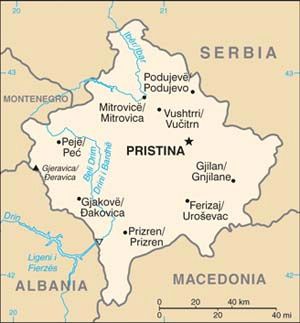Kosovo: A Possible Compromise On Customs And The North – Analysis
Finding a compromise solution on customs and the North – one that would help de-escalate the current confrontation – will require both Serbs and Albanians to abandon their maximalist positions, and the internationals to pursue a genuinely status neutral approach.
By Gerard Gallucci
The situation in northern Kosovo created by Pristina’s unilateral effort to change the reality on the ground – supported by NATO and EULEX efforts to push the Serbs to accept Kosovo customs – has become a tense standoff. KFOR “opens” a crossing point and dismantles a Serb blockade only to have the locals create another further down the road. KFOR blocks an alternative road, leaving others that can be used. KFOR cannot be everywhere and cannot afford to shoot everyone who disobeys. The internationals have lost the trust of the local community, the negotiations brokered by the EU have gone off the rails and the conflict over the north teeters on the brink of renewed violence.
What to do about customs and the north has become the pressing problem. EU facilitator Cooper reportedly visits the region next week for discussions. He must help find a formula for overcoming the crossing points stalemate for negotiations on other matters to resume with any hope of progress. I’ve written about a possible way for EULEX to approach customs in a status neutral fashion. Here I suggest a possible compromise that could allow everyone to protect their core interests.

For the northern Serbs, the essential demand is not to place Kosovo customs on the administrative boundary with Serbia and thus turn it into a political border. For Pristina and its international supporters, it is equally important to be able to close what they see as a hole in Kosovo’s “fence.” Before July 26, the north was outside anyone’s customs regime and some took advantage of the tax-free opportunity to trade in high value products both to the south and back to Serbia. EULEX says it is seeking to enforce a single Kosovo-wide customs zone and plans to collect fees and channel them to the Kosovo treasury. The Serbs say they will not accept Kosovo customs officers at the crossing points, nor pay customs to Pristina. They have barricaded the roads leading to the boundary crossings and to the south across the Ibar River.
The impasse has both political and economic dimensions. On the economic side, Pristina and Belgrade both want to capture the funds lost to their treasuries by smuggling through the north. Belgrade has solved one part of the problem by now subjecting the north to its VAT. Until July 26, Pristina was also gaining by collecting customs on goods as they reached south Mitrovica. A compromise from the economic perspective could be straight-forward: eliminate the tax advantage from exporting goods into the north from Serbia by Belgrade taxing them (i.e, the VAT) while implementing an approach to ensure customs is paid on all goods crossing into southern Kosovo. A side agreement could be made so that goods reaching southern Kosovo might have their VAT refunded to make up for the customs collected. Belgrade and Pristina would have good reasons to cooperate in this.
The political issues are harder to resolve but if the EU took a firmly status-neutral and balanced approach, it could be done. First would be to clearly retain EULEX control of any customs in the north. Second would be to ensure and assure that Kosovo customs would be collected only once goods reach south Mitrovica and not for those remaining in the north for use there. That’s the “easy” part.
The really hard part is what to do about Kosovo government officers at the Gates. The northern Serbs do not want Kosovo customs officials there. But having some regular Kosovo police (of whatever ethnicity) doing the routine boundary crossing checks – as before July 26 – should not be problematic. The core issue is the presence of Kosovo customs officers. A possible compromise here might be for the Serbs to accept Kosovo customs officers whose sole function it would be to observe shipments of goods bound for the south. These would not be “operational” but work to assist EULEX, which would report such data to Kosovo customs in the south. Goods passing through for local use would be free to cross without fees or the need to pass through customs in the south.
This is just an outline of a possible compromise. Important details would have to be worked out. But the essential element to reaching and implementing any agreement that would allow opening of the roads and de-escalation of the current confrontation is that both Serbs and Albanians accept they cannot have 100% of what they want, and for the internationals to take a truly status-neutral approach and make everyone stick to it.
Gerard M. Gallucci is a retired US diplomat and UN peacekeeper. He worked as part of US efforts to resolve the conflicts in Angola, South Africa and Sudan and as Director for Inter-American Affairs at the National Security Council. He served as UN Regional Representative in Mitrovica, Kosovo from July 2005 until October 2008 and as Chief of Staff for the UN mission in East Timor from November 2008 until June 2010. Gerard is also a member of TransConflict’s Advisory Board. The views expressed in this piece are his own and do not represent the position of any organization.
